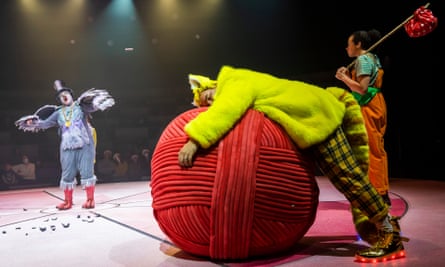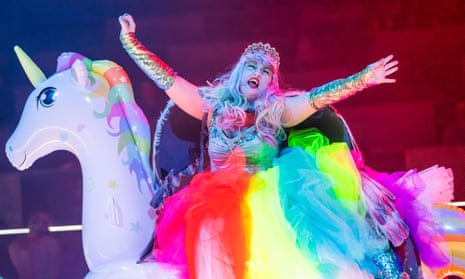It’s Tuesday night at the panto and the theatre resounds with a chorus of boos. But the show hasn’t started yet and National Theatre artistic director Rufus Norris is the only one on stage. He received thunderous applause when he strolled on; the boos come when Norris mentions tier 3, the increased level of Covid-19 restrictions that will close the building to audiences for the third time this year, and curtail the panto’s run.
This is the fourth preview of Dick Whittington, which was due to open to the press on Friday and be filmed later for a Christmas holiday broadcast. But when news broke on Monday afternoon that London would be entering tier 3 from Wednesday, the National swiftly assembled the film crew to capture a recording in front of a live audience in the Olivier theatre, reconfigured as an in-the-round space for social distancing. Seven cameras are placed around the auditorium, fixed among audience members or on a dolly that whizzes along the circular stage.
Norris, a former actor, has the flair of a showman as he declares “you can’t have a panto without an audience” and asks us “are you up for it?” Of course we are, although panto is not supposed to be quite like this: small clusters of masked audience members separated by empty seats – no jostling, no extended family outings. Seats are only available for groups of up to four people.

Pantomime isn’t the sort of art form that avoids the elephant in the room – it embraces it. So an ensemble of acrobatic actors in boiler suits are soon commanding the stage, wielding cleaning sprays and two-metre rulers, teaching us a dance routine. As Bow Belles, “the spirit of London”, Melanie La Barrie comes on in a luminous pink frock and reminds us we’ll get through the pandemic and must be kind to each other. Here comes Dick (Lawrence Hodgson-Mullings), who has travelled hills, valleys and all three tiers to get from Leeds to London. And from inside a furry-seated toilet climbs dastardly Queen Rat (Amy Booth-Steel), who sees that Londoners are laid low by lockdown and spies a chance to seize the mayoralty. A handful of pop bangers get a Covid-era remix and there are plenty of topical gags – about Capt Tom Moore and Dominic Cummings, Brexit and cronyism. Of course there’s a riotous, innuendo-hungry dame, too, played by Dickie Beau, who finds Dick gags hard to resist and may have misunderstood the “eat out to help out” initiative.
In the interval I catch up with Norris. What does he make of the logic that says gyms, saunas and non-essential shops can stay open for Christmas but his theatre must close? “It’s very frustrating,” he says, detailing all of the safety measures throughout the building. “As you can tell, we and every theatre have put a huge amount of effort in.” The National has vastly reduced the Olivier’s capacity from 1,150 to just under 500. It has staggered entrance times, audience members must register with NHS Test and Trace, face coverings are mandatory for over-11s, there is enhanced cleaning and you pre-order refreshments that are brought to your seat. “You go into a shopping centre,” Norris says by way of comparison, “and there’s almost no way of controlling that environment.”
At the start of November, theatres were ordered to close for a month for England’s second lockdown, which meant the National’s show Death of England: Delroy closed on its official opening night. “To go through this once was disappointing. To go through it twice, with the mad rush of it, is very dispiriting,” Norris admits. The National will be ready to reopen the panto as soon as they are permitted.

Earlier this week, leading West End producers Sonia Friedman and Cameron Mackintosh said the government’s closure of theatres was due, respectively, to serial mismanagement and panicking. At the Dominion theatre on Tuesday night, as the curtain came down on A Christmas Carol, actor Brian Conley – who plays Scrooge – gave a speech expressing his frustration at the shutdown. Norris says that the industry has taken great pains to speak as one voice, to share data and be as coherent as possible about their needs. He emphasises the plight of freelancers – the majority of any theatre’s workforce, many of whom have fallen through the cracks of financial support. The National was grateful to receive a loan of £19.7m from the government but what Norris has been calling for all year is a government-backed insurance scheme similar to that for the film industry. He points out that these things take time: the government’s £1.57bn arts recovery package was announced in July and the National just received news of its loan this month. They want to begin conversations now about insurance so that theatres can reopen with greater confidence rather than endure the financial risks of this stop-start approach.
Norris’s team went “hell for leather” to get the panto recorded with a live audience. “That buzz between actors and audience is multiplied by 100 in a panto,” he says, calling the tradition “daft and beautiful”. Written by Cariad Lloyd and Jude Christian, Dick Whittington – which was seen in a different version at the Lyric Hammersmith in 2018 – is only the second panto in the National’s history. In 1983, in the Lyttelton theatre, a traditional Victorian version of Cinderella was presented with Christmas music and carols.
The Olivier’s cavernous auditorium has been cleverly redesigned for Ned Bennett’s production, with table stands placed over some of the unused seats, giving the impression of a supper club. “You feel safe and looked after,” says the National’s project producer, Fran Miller. “It’s incredibly well ventilated.” Previews are usually a period of adjustment for a show – “we learn so much from putting it in front of an audience” – so to be filming the fourth preview performance for a global audience is unusual. An understudy was called in for one of those previews, which brought an extra challenge, but the show “got to a wonderful place” the night before the recording, says Miller.

Dick Whittington will be available for free on YouTube later this month. When Death of England: Delroy was streamed for 24 hours last month it had 80,000 views. Dick will surely be a lockdown festive hit – a Christmas present from the National to families deprived of their annual panto visit. (Donations, of course, are welcomed.) Norris worries that the pandemic will have a “quite profound” effect on children, deprived of opportunities to come together with others for live entertainment. “There’s very little practice in education – it’s learning by rote,” he says. “What the theatre can give young people is confidence, self-expression, creativity.”
Miller says that one of the joys of her job is watching young audiences at the family shows. “At the first preview, two little girls were in the front row, completely awestruck.” Wherever you see it – whether in an isolated bubble in a theatre or, as so often this year, on a screen at home – theatre can be life-changing. “I work in theatre because I saw Peter Pan in the Olivier,” says Miller, recalling her wonder. “People were flying!”
Dick Whittington is available on the National’s YouTube channel from 23-27 December.

Comments (…)
Sign in or create your Guardian account to join the discussion